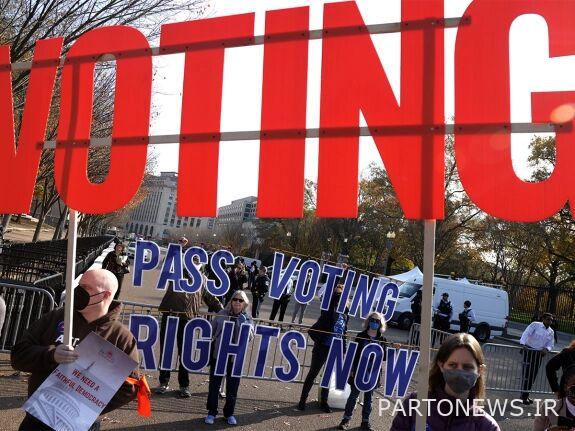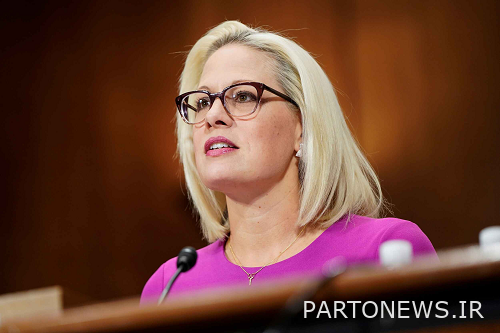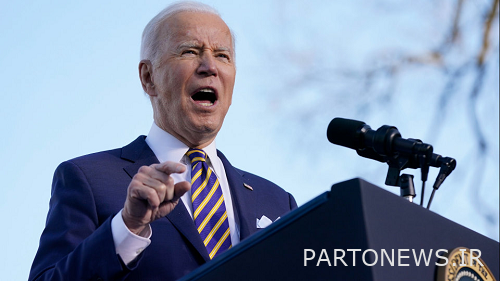The Last Breaths of American Democracy; Controversy over changing election laws

According to IRNA, the US election, which once imposed itself as a supreme example of democracy on world public opinion, entered a phase of decline that continues, especially immediately after the 2020 presidential election.
In this election, which was accompanied by the Corona epidemic, Democrats tried to hold elections in absentia and early, while Trump and Republicans saw this type of election as a source of fraud, and their supporters went to the polls. They encouraged voting.
Since Election Day has never been an official holiday in the United States, participation has not been possible, especially for those who have to attend work, which has reduced turnout, but last year’s experience showed that That a change in the voting system could provide better results, especially for Democrats.
Now, a year after the inauguration of US President Joe Biden and the uprising to block the certification of the 2020 presidential election, most Republican voters continue to lie that Biden was illegally elected to the White House. , Are stuck.
As a result, Republicans turned to the state legislatures in which they have a majority, and by rejecting the legitimacy of the 2020 election, they launched widespread campaigns of state-level voter repression and increasing efforts to overthrow the US electoral system.
Accordingly, they have adopted strict rules for voter identification and approval, as well as severe restrictions on absentee voting, which, as the 2022 midterm elections approach, alert election experts and voting rights advocates to the alarm. As a result, two bills were introduced in Congress.
In all but seven states, state legislatures have passed to pass these laws. Between January 1 and September 27, 2021, at least 19 states passed 33 laws that made it harder for Americans to vote.
In contrast, lawmakers in at least 25 other states responded to Americans’ desire to vote by facilitating eligible voting, and between January 1 and September 27, they enacted 62 laws that increased voting access.
The 33 laws passed in 2021 have had far-reaching implications for postal voting and early elections, and have tightened voter identification requirements.
In some states, they have become so strict that they do not have the right to distribute food or drink to people standing in line to vote, in which case they will be accused of interfering in elections.
Writing ballots for the elderly and disabled, encouraging them to participate in postal voting or polls in this area, will be prosecuted.
Thus, more than 425 bills with regulations restricting access to the vote have been submitted to 49 state legislatures in various US states.
What is the reason for the Democrats’ bill?
In these bills, Democrats have turned their attention to the overthrow of the election, which focuses on a strategy of denying the legitimate election results only by refusing to be accepted by the protesting presidential appointees; Like what Trump wanted Republican lawmakers in Michigan, Georgia and Pennsylvania to do.
This, and the consequent passage of restrictive laws in state assemblies, has angered much of society. Richard L. “The 2020 election showed many ways of trying to manipulate the election results,” said Hassan, a professor of law and political science at the University of California and author of Destroying Elections and Cheap Future Speech. “Although this system was difficult to establish in the previous election, because we had heroes, including Republicans, who opposed it, but there is good reason to believe that many of these people will no longer be in office during the next election.”
Under the circumstances, Senate Democrats are considering two steps that advocates say would repeal some Republican-backed state laws. Democrats are working to pass federal voting laws through the Senate, a move that Biden also supports.
The two Senate bills are currently under consideration.
What is the name of the Democrat election bill?
The first is a sweeping act called the Freedom of Expression Act, a compromise bill introduced by Senate Democrats after Democrat Sen. Joe Manchin said he would not support a broader House bill, the People’s Action Act.
The bill, first introduced in 2019, includes a long list of Democrat priorities before the last restrictive bills passed by the Republican House.
The second bill is the John Lewis Voting Promotion Act, which updates the 1965 Voting Rights Act. A copy of the bill has already been passed in the House of Representatives and is now awaiting a vote by senators.
Democrats say passage of the bill is necessary. Nineteen states passed restrictive voting laws last year over what was called former President Donald Trump’s election fraud rigging, and some state legislatures are expected to pass more this year. Review.
Both bills have the support of all 50 Democrats and independents in the Senate, and New York State Majority Leader Chuck Schumer has vowed to put both to the vote Monday before the Martin Luther King Jr.’s anniversary holiday. But the Democrats’ problem is that without the support of the 10 Republicans, whose votes are needed to win at least 60 votes, the bill would likely fail.
Democrats say they will then try to change the Senate bill to remove the 60-vote requirement, a move Biden approved on Tuesday, but it is unlikely to even get the support of all 50 Democratic senators who To pass it, they need to earn.
What is the purpose of these election bills?
The Freedom of Expression Act sets out a set of standards for federal elections to ensure that voters have equal access to ballot boxes across the country.
Proponents of her case have been working to make the actual transcript of this statement available online. To be similar. In fact, with this law, the states will comply with federal regulations.
Accordingly, states must provide a minimum number of early voting days and the possibility of voting by mail for any reason. Some recently passed restrictions in Republican states limit early voting hours and days.
Requirements and regulations After people turned to postal voting during the Corona epidemic and were adopted as a practice, Republican-controlled states, some of which previously restricted postal voting to individuals under the pretext of medical conditions or travel, requirements and regulations They laid down a new one.
The bill sets a national standard of acceptable forms for identifiers required for voter identification. The standard allows for a wider range of identification documents – and electronic copies – than what some of the states with strict voter identification laws currently have.
The bill also makes Election Day a national holiday, which advocates say will make it easier for people to vote. Others have warned, however, that this will again make disproportionately more difficult work for shift workers and those with childcare concerns.
To reduce long queues that have historically disproportionately affected colored communities, the bill requires states to reduce voting queues by 30 minutes or less.
The bill also imposes or increases penalties for intimidating and tricking voters into countering misinformation about the election, which has intensified since 2020.
What is the problem for Biden and the Democrats to pass these bills?
Opposition from the two Democratic senators seems to have dashed President Joe Biden’s hopes for sweeping electoral reform.
In a last-ditch effort, Biden called for Philippaster Amendments to pass two suffrage bills: the Freedom of Expression Act and the John Lewis Promotion Bill. Both bills have little chance of being passed in the Senate without changing Philibuster’s rules.
Biden argues that because of Republican opposition to the bill, Philibuster, a Senate bylaw, should be repealed so that Democrats can pass the bill.

But Democratic Sen. Kirsten Cinema opposed the move, saying Philipster’s abolition would increase the “divisive disease” that the United States “suffers from,” adding: “We have to address the disease itself, the divisive disease, to protect our democracy.”
Although Trump and other Republicans pushed for drastic changes to the election law during his presidency, Senate Republican Minority Leader Mitch McConnell called the Democratic senator’s movie remarks an important act of “political courage” that could “Save the Senate as a legal entity.”
Republicans almost unanimously oppose the law, calling it a federal aggression that violates states’ ability to hold elections. They also note the Democrats’ opposition to the changes Trump intended during his presidency.
“If suffrage is the cornerstone of our democracy, then how can we, with a clear conscience, allow the Republican Party to pass a law that suppresses voting,” said Senate Majority Leader Chuck Schumer.

US President Joe Biden, who addressed Congress on Thursday, told reporters in a brief speech that he was not confident his plans would be implemented.
But he expressed hope and continued: one thing is certain; Like any other important civil rights bill that came our way, if we miss the first time, we can go back and try it a second time.
The president, who has served in the Senate for many years, expressed concern about election laws passed in some states, saying “state legislatures continue to change the law. Not who can vote, but who can vote.” It can count the votes, the votes must be counted, it’s about overthrowing the election, not just whether the people vote or not, but who counts the votes? This is what makes it so different from anything else that We have done so far.
Biden added: “I do not know if we can do it or not, but I do know one thing: as long as I’m breathing, as long as I’m in the White House, as long as I’m involved, I’re going to fight to change the way legislation works. .
Philibaster is a code of conduct that allows dissenting senators to extend a speech to extend the deadline for the bill to be on the agenda to prevent the bill from entering the voting process.
To prevent Philibaster, a 60-senator vote is needed, which in the current situation means the need for 10 Republican votes, and is practically impossible. Currently, US Senate seats are split 50-50 between Democrats and independents and Republicans, and in certain circumstances, the vote of US Vice President and Senate Speaker Kamala Harris will be decisive.
For Democrats and Biden, passing this law is a political imperative. Failure to do so will break the main campaign promise to black voters who helped the Democrats control the White House and Congress, and will have a detrimental effect just before the midterm congressional election.
It will also be the second major setback for Biden’s agenda in a month after Democrat Sen. Joe Mancin halted work on Biden’s $ 2 trillion package of social and environmental initiatives shortly before Christmas.
Noam Chomsky warns of soft coup in America
American philosopher and theorist Noam Chomsky warned that a soft coup was taking place in the United States, saying that former US President Donald Trump still had a fan base.
The socio-political analyst and critic recently warned in a press conference about the danger of a soft coup in the United States after the controversial attack of Trump supporters on Congress on January 6, 2021.
Asked about the consequences of this violent event, Chomsky noted that the move, which was in fact an attempt to overthrow an elected government, was made quite explicitly by Trump; “With the title that the elections were rigged and stolen, then go to Congress!”
Chomsky warned that the Republican Party was no longer a political entity but a neo-fascist power: “Although the United States is a technologically and culturally advanced society, it still lags behind in other areas.”
.

